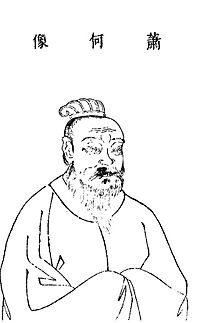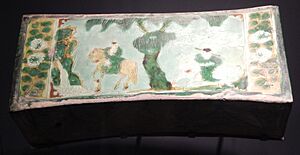Xiao He facts for kids
Quick facts for kids
Xiao He
|
|
|---|---|
| 蕭何 | |

A portrait of Xiao He in the Sancai Tuhui
|
|
| Chancellor of State (相國) | |
| In office 196–193 BC |
|
| Monarch | Emperor Gaozu of Han / Emperor Hui of Han |
| Succeeded by | Cao Shen |
| Imperial Chancellor (丞相) | |
| In office 206–196 BC |
|
| Monarch | Emperor Gaozu of Han |
| Personal details | |
| Born | 257 BC Feng County, Jiangsu |
| Died | 16 August 193 BC (aged 64) |
| Children |
|
| Occupation | Calligrapher, politician |
| Posthumous name | Marquis Wenzhong (文終侯) |
| Peerage | Marquis of Zan (酇侯) |
| Religious postings and religion | Taoism |
Xiao He (born 257 BC – died 16 August 193 BC) was an important Chinese politician. He lived during the early Western Han dynasty. He worked for Liu Bang, who started the Han dynasty. Xiao He helped Liu Bang during a big fight against the Qin dynasty. He also fought with Liu Bang against his rival, Xiang Yu, in the Chu–Han Contention. After the Han dynasty began, Xiao He became a top government official called the chancellor. He held this job until he passed away. Because of his great help, he is known as one of the "Three Heroes of the early Han dynasty" (漢初三傑). The other two heroes were Han Xin and Zhang Liang.
Contents
Early Life and Beginnings
Xiao He was born in Fengyi County. This area is now called Feng County in Jiangsu. When he was young, he worked as a secretary in the local government office. He was a very good student and was friendly to everyone. He knew a lot about law and had many friends. These friends included Liu Bang, Cao Shen, Fan Kuai, Xiahou Ying, and Zhou Bo.
Helping to Overthrow the Qin Dynasty
Once, Liu Bang was taking some prisoners to work. He let them go and became a fugitive himself. He hid in a secret place on Mount Mangdang. He kept in touch with Xiao He and Cao Shen.
In 209 BC, Chen Sheng and Wu Guang started a rebellion. They wanted to overthrow the Qin dynasty. Many other rebellions began across China. The leader of Pei County thought about joining the rebellion. He listened to Xiao He and Cao Shen's advice. They told him to invite Liu Bang back to help.
However, the leader changed his mind. He would not let Liu Bang's group into the city. He was afraid Xiao He and Cao Shen might open the gates for Liu Bang. So, he planned to have them killed. But Xiao He and Cao Shen escaped. They joined Liu Bang. Xiao He suggested that Liu Bang send letters into the city. These letters were shot in on arrows. They asked the townsfolk to join Liu Bang. The people agreed. They killed the county leader and welcomed Liu Bang back.
After returning, the people wanted Liu Bang to lead them. Liu Bang did not want to be the leader at first. So, they decided to pick a leader by luck. Xiao He was in charge of this. He wrote the names of ten respected men, including Liu Bang, on papers. He shuffled them. Xiao He then asked Liu Bang to pick one without looking. Liu Bang picked his own name by chance. Liu Bang still wanted to say no. But Xiao He quickly grabbed the other papers. He chewed them up. Then he announced Liu Bang as their leader. Liu Bang became known as the "Duke of Pei." He built his rebel army in Pei County. Xiao He and his friends helped him. Later, Liu Bang learned that all ten papers had his name on them. Xiao He had tricked the system to help him become leader.
In 206 BC, the Qin dynasty fell. The last Qin ruler, Ziying, gave up to Liu Bang. Liu Bang's army took over the Qin capital city, Xianyang. When they entered the Epang Palace, Liu Bang and most of his men took treasures and women. But Xiao He quickly went to the chancellor's office. He made sure it was heavily guarded. Xiao He then took a few men to collect all the important government documents. He brought them out safely. Xiao He later explained that these documents were more valuable than riches. They had important information about the Qin Empire. This information would be very useful.
The Chu–Han War
Finding Han Xin
Liu Bang had to leave Xianyang later. This was because Xiang Yu's army arrived and took over the city. After taking things from Xianyang and destroying the palace, Xiang Yu divided the old Qin Empire. He made it into the Eighteen Kingdoms. Liu Bang was given the title "King of Han." He was moved to the distant Bashu region, which is now in Sichuan. Xiao He and his followers went with him.
Liu Bang was not happy. He wanted to attack Xiang Yu. The land of Guanzhong was supposed to be his. This was based on an old promise. But Xiang Yu gave it to three former Qin generals instead. However, Xiao He and others convinced Liu Bang to stay in Bashu for a while. They told him to build up his army there. This would prepare him for a future fight against Xiang Yu. Liu Bang made Xiao He the chancellor of the Han kingdom.
During this time, Xiao He met Han Xin. Han Xin had just joined Liu Bang's army. He was a low-ranking soldier. But Xiao He saw that Han Xin was very smart at military plans. Soon after, many of Liu Bang's men left. They found it hard to live in Bashu. Han Xin also left. He was disappointed because he felt his talent was not being used. When Xiao He heard Han Xin had left, he quickly went to find him. He wanted to bring him back. He didn't even tell Liu Bang in time. Xiao He caught up with Han Xin after following him for days, even at night. He convinced Han Xin to return.
Meanwhile, Liu Bang thought Xiao He had also left him. He was shocked. But he was relieved when he saw Xiao He return with Han Xin days later. Liu Bang asked Xiao He, "Many people left, why did you only bring back Han Xin?" Xiao He then strongly told Liu Bang how talented Han Xin was. He said Han's skills were unmatched. Liu Bang listened to Xiao He. He made Han Xin a general.
Taking Back the Three Qin Lands
In 206 BC, Liu Bang took over the Three Qins. He left Xiao He in charge of Guanzhong and Bashu. Liu Bang then led his army east to attack Xiang Yu's Western Chu kingdom. Xiao He managed these lands very well. He sent supplies, food, and more soldiers to Liu Bang's army at the war front. In Guanzhong, Xiao He brought back peace and order. He created a new way of governing. He also rebuilt damaged buildings. Under his new system, taxes were lowered for poor people. Land that belonged to rich Qin nobles was given to farmers. This helped grow more food. Smart and respected men were chosen from common people to help government officials.
The Final Battle
Liu Bang finally defeated Xiang Yu at the Battle of Gaixia in 202 BC. This united China under his rule. He was called "Emperor." He is known as "Emperor Gaozu of Han." The next year, Gaozu rewarded his helpers. Xiao He received the title "Marquis of Zan" (酇侯). He also remained chancellor. Gaozu gave Xiao He a special honor. Xiao He was allowed to enter the imperial court with his sword and shoes on. Others had to walk quickly and without their shoes.
Serving the Han Dynasty
In 201 BC, Emperor Gaozu wanted to build his capital city in Luoyang. But Zhang Liang suggested Xianyang instead. Xianyang was surrounded by natural defenses like mountains. It also had good land for farming. Gaozu put Xiao He in charge of building in Xianyang. Two years later, the project was finished. Xiao He showed Gaozu around Xianyang. The new palace was called Weiyang Palace. It was the main imperial palace for the entire Western Han dynasty and Xin dynasty. Gaozu also changed Xianyang's name to "Chang'an." This name meant "long-lasting peace."
Xiao He's Role in Han Xin's Downfall
In 196 BC, Gaozu was away fighting a rebellion. This rebellion was led by Chen Xi. One of Han Xin's servants told Empress Lü Zhi that Han Xin was planning something. The servant said Han Xin was working with Chen Xi. He was planning to take over Chang'an. Empress Lü asked Xiao He for help. They made a plan to trick Han Xin. Xiao He sent a message to Han Xin. It said Gaozu had won against Chen Xi. It asked Han Xin to meet the emperor and congratulate him. As soon as Han Xin arrived at Changle Palace, he was arrested. He was then killed for supposedly planning treason.
Later Years and Passing
In 195 BC, Xiao He saw that Chang'an was getting crowded. The imperial garden had a lot of empty land. So, he suggested to Gaozu to give parts of the garden to farmers. Gaozu was not happy. He accused Xiao He of taking bribes and disrespecting his power. Xiao He was arrested and put in prison. But he was released later. Gaozu realized that Xiao He truly cared about the people. Gaozu called Xiao He to see him. He joked, "The chancellor asked for the fields in the imperial garden for the people. But I did not agree. This shows I am like bad rulers, and you are the best chancellor. So, I put you in prison on purpose to show people I can be a tyrant."
After Gaozu died, Xiao He continued to serve. He worked for Gaozu's son, Emperor Hui, as chancellor. Xiao He died in 193 BC. Before he died, Xiao He suggested that Cao Shen should take his place. Cao Shen followed the government system Xiao He had set up. He kept it working well but did not make many new changes.
Family History
Xiao He's great-grandson, Xiao Biao (蕭彪), moved to Lanling. This is near present-day Zaozhuang, Shandong. He lived a quiet life there.
Two of his family members later started their own royal families. This happened during the Southern and Northern Dynasties period. Xiao Daocheng founded the Southern Qi dynasty. His distant cousin Xiao Yan founded the next Liang dynasty.
Xiao He's Lasting Impact
Some Chinese idioms and sayings come from events in Xiao He's life. Here are a few:
- Xiao He chases Han Xin under the moonlight (蕭何月下追韓信): This saying comes from when Xiao He followed Han Xin for days, even at night. He wanted to bring Han Xin back to Liu Bang. It means you need to act quickly and urgently without delay.
- Success is due to Xiao He, downfall is also due to Xiao He (成也蕭何 敗也蕭何 Hangul: 성야소하 폐야소하): Xiao He helped Han Xin become a general. This allowed Han Xin to use his talents. But Xiao He also played a part in Han Xin's death. This saying means that the same thing or person can cause both success and failure.
- Cao following Xiao's rules (萧规曹随): Cao Shen was Xiao He's successor as chancellor. He used the same government system Xiao He had created. He kept it working well but did not make new changes. This saying means to continue the work of the person who came before you.
 | DeHart Hubbard |
 | Wilma Rudolph |
 | Jesse Owens |
 | Jackie Joyner-Kersee |
 | Major Taylor |


